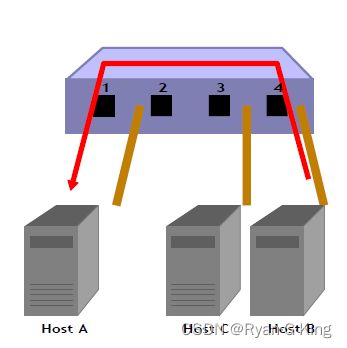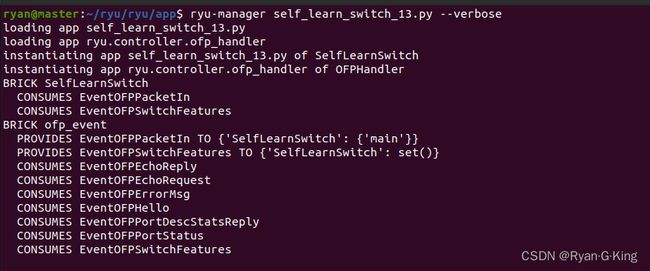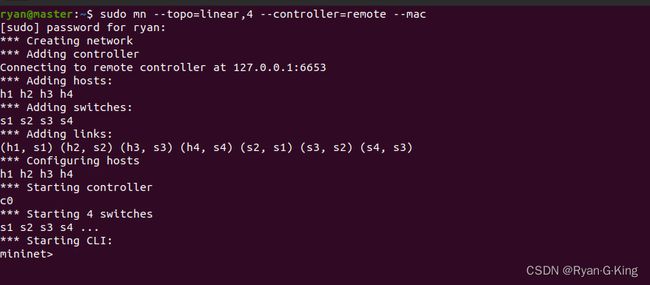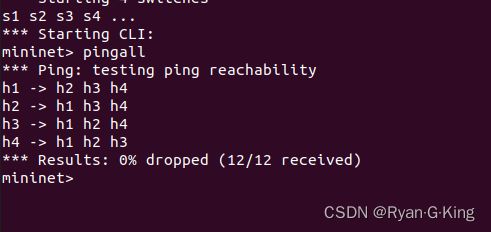SDN实验(四)——Learning Switch自学习交换机
SDN实验(四)——Learning Switch自学习交换机
- 一、自学习交换机原理
-
- (一)普通交换机实现
- (二)SDN交换机实现
- 二、自学习交换机代码实现
-
- (一)代码
- (二)代码讲解
- (三)实验
- 三、扩展
-
- (一)pkt = packet.Packet(msg.data)
- (二)eth_pkt = pkt.get_protocol(ethernet.ethernet)
- (三)eth_pkt = pkt.get_protocol(ethernet.ethernet)
一、自学习交换机原理
(一)普通交换机实现
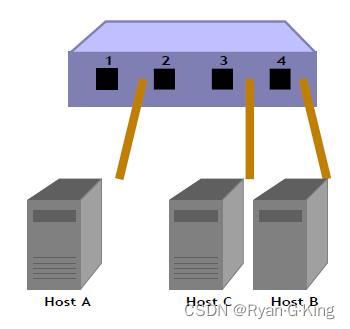
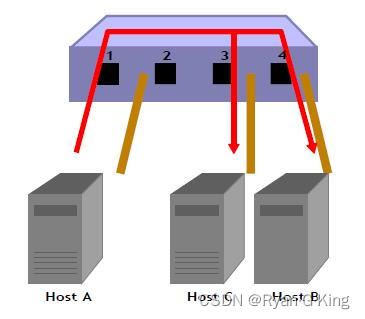
交换机MAC地址表记录了统一网段中的各个主机对应交换机的端口和主机的MAC地址。
当主机A要和主机B通信时,初始交换机MAC表是空的,会先记录主机A的MAC地址和对应的交换机端口,然后查找交换机MAC中是否有目标MAC地址,没有找到,会向其他所有端口泛洪查找
泛洪,通知其他主机。主机C接收到数据包,发现不是自己的,则不处理,丢弃数据包。当主机B接收后,发现是找自己的,则可以进行消息通信。交换机先进行MAC学习,记录主机B的MAC信息,再进行查表转发,单播发送给主机A
(二)SDN交换机实现
SDN中交换机不存储MAC表,(datapath)只存流表(flow table)。其地址学习操作由控制器(控制器中包含MAC 地址表)实现,之后控制器下发流表项给交换机
-
初始状态

Flow table 为空白的状况。
将 host A 接到端口 1,host B 接到端口 4,host C 接到端口 3。 -
host A -->host B
当 host A 向 host B 发送数据包。这时后会触发 Packet-In 事件。host A 的 MAC 地址会被端口 1 给记录下来。由于 host B 的 MAC 地址尚未被学习,因此会进行 Flooding 并将数据包往 host B 和 host C 发送。

Packet-In:
in-port:1
eth-dst:host B
eth-src:host A
Packet-Out:
action:OUTPUT:Flooding -
host B–>host A
数据包从 host B 向 host A 返回时,在 Flow table 中新增一笔 Flow Entry,并将封包转送到端口 1。因此该封包并不会被 host C 收到。

Packet-In:
in-port:4
eth-dst:host A
eth-src:host B
Packet-Out:
action:OUTPUT:port 1 -
host A–>host B
再一次,host A 向 host B 发送数据包,在 Flow table 中新增一个 Flow Entry 接着转送封包到端口 4。

Packet-In:
in-port:1
eth-dst:host B
eth-src:host A
Packet-Out:
action:OUTPUT:port 4
二、自学习交换机代码实现
(一)代码
from ryu.base import app_manager
from ryu.ofproto import ofproto_v1_3
from ryu.controller import ofp_event
from ryu.controller.handler import set_ev_cls
from ryu.controller.handler import CONFIG_DISPATCHER,MAIN_DISPATCHER
from ryu.lib.packet import packet
from ryu.lib.packet import ethernet
class SelfLearnSwitch(app_manager.RyuApp):
OFP_VERSIONS = [ofproto_v1_3.OFP_VERSION] #set openflow protocol version while we support
def __init__(self,*args,**kwargs):
super(SelfLearnSwitch,self).__init__(*args,**kwargs)
#set a data construction to save MAC Address Table
self.Mac_Port_Table={}
@set_ev_cls(ofp_event.EventOFPSwitchFeatures)
def switch_features_handler(self,ev):
'''
manage the initial link, from switch to controller
'''
#first parse event to get datapath and openflow protocol
msg = ev.msg
datapath = msg.datapath
ofproto = datapath.ofproto
ofp_parser = datapath.ofproto_parser
self.logger.info("datapath: %s link to controller",datapath.id)
#secondly set match and action
match = ofp_parser.OFPMatch() #all data message match successful
actions = [ofp_parser.OFPActionOutput(ofproto.OFPP_CONTROLLER,ofproto.OFPCML_NO_BUFFER)] #set receive port and buffer for switch
#add flow and send it to switch in add_flow
self.add_flow(datapath,0,match,actions,"default flow entry")
def add_flow(self,datapath,priority,match,actions,extra_info):
"""
add flow entry to switch
"""
#get open flow protocol infomation
ofproto = datapath.ofproto
ofp_parser = datapath.ofproto_parser
#set instruction infomation from openflow protocol 1.3
inst = [ofp_parser.OFPInstructionActions(ofproto.OFPIT_APPLY_ACTIONS,actions)]
#set flow entry mod
mod = ofp_parser.OFPFlowMod(datapath=datapath,priority=priority,match=match,instructions=inst)
print("send "+extra_info)
#send flow entry to switch
datapath.send_msg(mod)
@set_ev_cls(ofp_event.EventOFPPacketIn,MAIN_DISPATCHER)
def packet_in_handler(self,ev):
'''
manage infomation from switch
'''
#first parser openflow protocol
msg = ev.msg
datapath = msg.datapath
ofproto = datapath.ofproto
ofp_parser = datapath.ofproto_parser
#get datapath id from datapath, and save dpid into MAC table (default)
dpid = datapath.id
self.Mac_Port_Table.setdefault(dpid, {})
#analysize packet, get ethernet data, get host MAC info
pkt = packet.Packet(msg.data)
eth_pkt = pkt.get_protocol(ethernet.ethernet)
dst = eth_pkt.dst
src = eth_pkt.src
#get switch port where host packet send in
in_port = msg.match['in_port']
self.logger.info("Controller %s get packet, Mac address from: %s send to: %s , send from datapath: %s,in port is: %s"
,dpid,src,dst,dpid,in_port)
#save src data into dictionary---MAC address table
self.Mac_Port_Table[dpid][src] = in_port
#query MAC address table to get destinction host`s port from current datapath
#---first: find port to send packet
#---second: not find port,so send packet by flood
if dst in self.Mac_Port_Table[dpid]:
Out_Port = self.Mac_Port_Table[dpid][dst]
else:
Out_Port = ofproto.OFPP_FLOOD
#set match-action from above status
actions = [ofp_parser.OFPActionOutput(Out_Port)]
#add a new flow entry to switch by add_flow
if Out_Port != ofproto.OFPP_FLOOD: #if Out_port == ofproto.OFPP_FLOOD ---> flow entry == default flow entry, it already exist
match = ofp_parser.OFPMatch(in_port=in_port,eth_dst = dst)
self.add_flow(datapath, 1, match, actions,"a new flow entry by specify port")
self.logger.info("send packet to switch port: %s",Out_Port)
#finally send the packet to datapath, to achive self_learn_switch
Out = ofp_parser.OFPPacketOut(datapath=datapath,buffer_id=msg.buffer_id,
in_port=in_port,actions=actions,data=msg.data)
datapath.send_msg(Out)
(二)代码讲解
前半部分的代码和集线器部分的异曲同工,就不多加赘述了,重点在讲解packet_in_handler之后的代码。
from ryu.base import app_manager
from ryu.ofproto import ofproto_v1_3
from ryu.controller import ofp_event
from ryu.controller.handler import set_ev_cls
from ryu.controller.handler import CONFIG_DISPATCHER,MAIN_DISPATCHER
from ryu.lib.packet import packet
from ryu.lib.packet import ethernet
class SelfLearnSwitch(app_manager.RyuApp):
OFP_VERSIONS = [ofproto_v1_3.OFP_VERSION] #设置OpenFlow协议版本
def __init__(self,*args,**kwargs):
super(SelfLearnSwitch,self).__init__(*args,**kwargs)
#设置保存MAC地址表的数据结构
self.Mac_Port_Table={}
@set_ev_cls(ofp_event.EventOFPSwitchFeatures)
def switch_features_handler(self,ev):
'''
交换机和控制器的初始连接
其实这个和之前的集线器的代码是相似的
'''
#解析OpenFlow协议信息
msg = ev.msg
datapath = msg.datapath
ofproto = datapath.ofproto
ofp_parser = datapath.ofproto_parser
self.logger.info("datapath: %s link to controller",datapath.id)
#设置匹配信息和动作列表
match = ofp_parser.OFPMatch() #all data message match successful
actions = [ofp_parser.OFPActionOutput(ofproto.OFPP_CONTROLLER,ofproto.OFPCML_NO_BUFFER)] #set receive port and buffer for switch
#下发默认流表
self.add_flow(datapath,0,match,actions,"default flow entry")
def add_flow(self,datapath,priority,match,actions,extra_info):
"""
add flow entry to switch
"""
#get open flow protocol infomation
ofproto = datapath.ofproto
ofp_parser = datapath.ofproto_parser
#set instruction infomation from openflow protocol 1.3
inst = [ofp_parser.OFPInstructionActions(ofproto.OFPIT_APPLY_ACTIONS,actions)]
#set flow entry mod
mod = ofp_parser.OFPFlowMod(datapath=datapath,priority=priority,match=match,instructions=inst)
print("send "+extra_info)
#send flow entry to switch
datapath.send_msg(mod)
@set_ev_cls(ofp_event.EventOFPPacketIn,MAIN_DISPATCHER)
def packet_in_handler(self,ev):
'''
manage infomation from switch
'''
#解析OpenFlow协议信息
msg = ev.msg
datapath = msg.datapath
ofproto = datapath.ofproto
ofp_parser = datapath.ofproto_parser
#获取datapath(虚拟交换机的id),用dpid初始化一个键值
dpid = datapath.id
self.Mac_Port_Table.setdefault(dpid, {})
#分析packert数据包,因为转发的包,都是基于以太网协议的,所以我们需要用到以太网协议进行解析,获取源MAC和目的MAC
pkt = packet.Packet(msg.data)
eth_pkt = pkt.get_protocol(ethernet.ethernet)
dst = eth_pkt.dst
src = eth_pkt.src
#获取datapath的数据输入端口
in_port = msg.match['in_port']
self.logger.info("Controller %s get packet, Mac address from: %s send to: %s , send from datapath: %s,in port is: %s",dpid,src,dst,dpid,in_port)
#将源MAC地址保存,学习,放入MAC表中
self.Mac_Port_Table[dpid][src] = in_port
#查询MAC表,是否有目标MAC地址的键值
#如果找到,我们则按照该端口发送
#如果没有找到,我们需要泛洪发送给下一个(或者下几个)交换机,依次查询
if dst in self.Mac_Port_Table[dpid]:
Out_Port = self.Mac_Port_Table[dpid][dst]
else:
Out_Port = ofproto.OFPP_FLOOD
#开始设置match-actions匹配动作
actions = [ofp_parser.OFPActionOutput(Out_Port)]
#进行对应的流表项下发 《重点》
if Out_Port != ofproto.OFPP_FLOOD: #if Out_port == ofproto.OFPP_FLOOD ---> flow entry == default flow entry, it already exist
match = ofp_parser.OFPMatch(in_port=in_port,eth_dst = dst)
self.add_flow(datapath, 1, match, actions,"a new flow entry by specify port")
self.logger.info("send packet to switch port: %s",Out_Port)
#最后我们将之前交换机发送上来的数据,重新发给交换机
Out = ofp_parser.OFPPacketOut(datapath=datapath,buffer_id=msg.buffer_id,
in_port=in_port,actions=actions,data=msg.data) #我们必须加上这个data,才可以将packet数据包发送回去《重点》不然会出错××××××
datapath.send_msg(Out)
(三)实验
三、扩展
(一)pkt = packet.Packet(msg.data)
一个类,在Ryu/lib/packet/模块下,用于包的解码/编码。
class Packet(StringifyMixin):
"""A packet decoder/encoder class.
An instance is used to either decode or encode a single packet.
*data* is a bytearray to describe a raw datagram to decode. data是一个未加工的报文数据, 即msg.data直接从事件的msg中获取的数据
When decoding, a Packet object is iteratable.
Iterated values are protocol (ethernet, ipv4, ...) headers and the payload.
Protocol headers are instances of subclass of packet_base.PacketBase.
The payload is a bytearray. They are iterated in on-wire order.
*data* should be omitted when encoding a packet.
"""
# Ignore data field when outputting json representation.
_base_attributes = ['data']
def __init__(self, data=None, protocols=None, parse_cls=ethernet.ethernet): 协议解析,默认是按照以太网协议
super(Packet, self).__init__()
self.data = data
if protocols is None:
self.protocols = []
else:
self.protocols = protocols
if self.data:
self._parser(parse_cls)
(二)eth_pkt = pkt.get_protocol(ethernet.ethernet)
返回与指定协议匹配的协议列表。从packet包中获取协议信息(协议包含我们需要的dst,src等)
class Packet(StringifyMixin):
def add_protocol(self, proto):
"""Register a protocol *proto* for this packet.
This method is legal only when encoding a packet.
When encoding a packet, register a protocol (ethernet, ipv4, ...)
header to add to this packet.
Protocol headers should be registered in on-wire order before calling
self.serialize.
"""
self.protocols.append(proto)
def get_protocols(self, protocol):
"""Returns a list of protocols that matches to the specified protocol.
"""
if isinstance(protocol, packet_base.PacketBase):
protocol = protocol.__class__
assert issubclass(protocol, packet_base.PacketBase)
return [p for p in self.protocols if isinstance(p, protocol)]
(三)eth_pkt = pkt.get_protocol(ethernet.ethernet)
一个类,也在Ryu/lib/packet/模块下,用于以太网报头编码器/解码器类。
class ethernet(packet_base.PacketBase):
"""Ethernet header encoder/decoder class.
An instance has the following attributes at least.
MAC addresses are represented as a string like '08:60:6e:7f:74:e7'.
__init__ takes the corresponding args in this order.
============== ==================== =====================
Attribute Description Example
============== ==================== =====================
dst destination address 'ff:ff:ff:ff:ff:ff'
src source address '08:60:6e:7f:74:e7'
ethertype ether type 0x0800
============== ==================== =====================
"""
_PACK_STR = '!6s6sH'
_MIN_LEN = struct.calcsize(_PACK_STR)
_MIN_PAYLOAD_LEN = 46
_TYPE = {
'ascii': [
'src', 'dst'
]
}
def __init__(self, dst='ff:ff:ff:ff:ff:ff', src='00:00:00:00:00:00',
ethertype=ether.ETH_TYPE_IP):
super(ethernet, self).__init__()
self.dst = dst
self.src = src
self.ethertype = ethertype
@classmethod
def parser(cls, buf):
dst, src, ethertype = struct.unpack_from(cls._PACK_STR, buf)
return (cls(addrconv.mac.bin_to_text(dst),
addrconv.mac.bin_to_text(src), ethertype),
ethernet.get_packet_type(ethertype),
buf[ethernet._MIN_LEN:])
def serialize(self, payload, prev):
# Append padding if the payload is less than 46 bytes long
pad_len = self._MIN_PAYLOAD_LEN - len(payload)
if pad_len > 0:
payload.extend(b'\x00' * pad_len)
return struct.pack(ethernet._PACK_STR,
addrconv.mac.text_to_bin(self.dst),
addrconv.mac.text_to_bin(self.src),
self.ethertype)
@classmethod
def get_packet_type(cls, type_):
"""Override method for the ethernet IEEE802.3 Length/Type
field (self.ethertype).
If the value of Length/Type field is less than or equal to
1500 decimal(05DC hexadecimal), it means Length interpretation
and be passed to the LLC sublayer."""
if type_ <= ether.ETH_TYPE_IEEE802_3:
type_ = ether.ETH_TYPE_IEEE802_3
return cls._TYPES.get(type_)
参考:
- 山上有风景:Ryu应用开发:https://www.cnblogs.com/ssyfj/p/11731565.html
- Ryubook:http://osrg.github.io/ryu-book/en/html/
- Ryu官方文档:https://ryu.readthedocs.io/en/latest/
关注微信公众号:“程序员小菜鸡”免费获取资源
欢迎查看我的github博客:Welcome To Ryan’s Home
